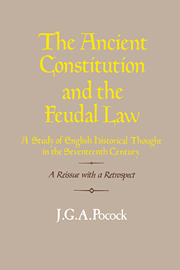 The Ancient Constitution and the Feudal Law
The Ancient Constitution and the Feudal Law Book contents
- Frontmatter
- Contents
- Preface
- Preface to the First Edition
- Part One The Ancient Constitution and the Feudal Law
- I Introductory: the French Prelude to Modern Historiography
- II The Common-law Mind: Custom and the Immemorial
- III The Common-law Mind: the Absence of a Basis of Comparison
- IV The Discovery of Feudalism: French and Scottish Historians
- V The Discovery of Feudalism: Sir Henry Spelman
- VI Interregnum: the Oceana of James Harrington
- VII Interregnum: the First Royalist Reaction and the Response of Sir Matthew Hale
- VIII The Brady Controversy
- IX Conclusion: 1688 in the History of Historiography
- Part Two The Ancient Constitution Revisited: a Retrospect from 1986
- Index
IX - Conclusion: 1688 in the History of Historiography
Published online by Cambridge University Press: 18 November 2009
- Frontmatter
- Contents
- Preface
- Preface to the First Edition
- Part One The Ancient Constitution and the Feudal Law
- I Introductory: the French Prelude to Modern Historiography
- II The Common-law Mind: Custom and the Immemorial
- III The Common-law Mind: the Absence of a Basis of Comparison
- IV The Discovery of Feudalism: French and Scottish Historians
- V The Discovery of Feudalism: Sir Henry Spelman
- VI Interregnum: the Oceana of James Harrington
- VII Interregnum: the First Royalist Reaction and the Response of Sir Matthew Hale
- VIII The Brady Controversy
- IX Conclusion: 1688 in the History of Historiography
- Part Two The Ancient Constitution Revisited: a Retrospect from 1986
- Index
Summary
IT is possible to regard the fall of James II as a triumph, on the plane of historical thought, for the concept of the ancient constitution. As we have already seen, in the microcosm of the Tower records office the Revolution meant the fall of Brady and the substitution of Petyt, who reigned there as a respected scholar to the end of his days; and he had opportunity to assist the House of Lords in their efforts to define what had happened in 1688 by laying his doctrines of English history before them. There is some record of this occasion, and the circumstances are of interest. The House had reached the point, in debating the resolution sent up to them by the Commons, where they were asked to agree that James had broken the original contract between king and people. They had recourse to the legal counsel appointed to advise them and inquired what this original contract might be, ‘and whether there be any such or not’. The greater part of this body of counsel—the six judges, Atkyns, Montagu, Dolben, Levinz, Nevill, Holt—were all of the opinion that the contract might be a most liberal and rational concept, but they could not find it in the laws of England. Two of the three additional counsel, Bradbury and Whitelocke, spoke in favour of the contract, but in vague and inconclusive language. Then came Petyt's turn. We have some notes of what he said.
- Type
- Chapter
- Information
- The Ancient Constitution and the Feudal LawA Study of English Historical Thought in the Seventeenth Century, pp. 229 - 252Publisher: Cambridge University PressPrint publication year: 1987
